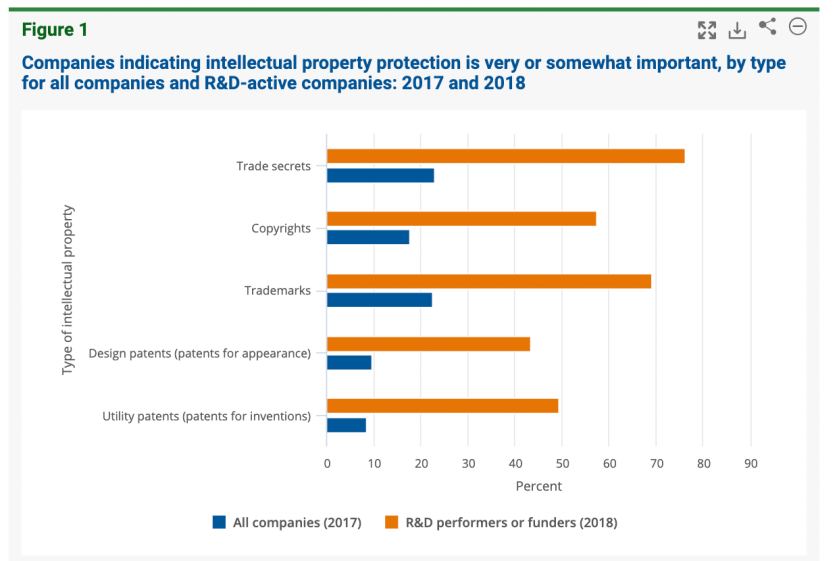A National Science Foundation study released in 2021 about the value businesses place on various IP rights found that organizations that conduct significant R&D place a higher level of importance on trade secrets than utility patents and other IP rights.
About 76% of R&D-active companies reported that trade secrets were very or somewhat important to them. Trademarks were about 69%, copyrights 57% and utility patents 49%. Design patents were regarded as very or somewhat important by 43% of these respondents (see graph above).
A higher share of R&D-active businesses classified in Manufacturing Industries in the 2018 data consider IP protection very or somewhat important than do those businesses in non-manufacturing industries.
Surprisingly, 50.5% of companies that performed or funded R&D found utility patents “not at all valuable.” Some observers believe that if businesses are not filling patents, they are not disclosing inventions, which is harmful to innovation.
“This may be a result of a perception that the value of U.S. utility patents has diminished in recent years to due to erosion of patentability standards, coupled with increased cost and risk of enforcement,” James Pooley told IP CloseUp. Pooley is a trade secret expert and former Deputy Director General of WIPO and advisory board member of the Center for Intellectual Property Understanding.

Other Surprises
According to the research, companies classified as Mining and Oil and Gas Extraction placed a higher importance on utility patents than even those producing Semiconductors and Pharmaceutical and Medicines.
Trademarks were more valuable to Software Publishers than any other industry, including Beverages and Tobacco and Manufacturing. Software Publishers also highly valued copyrights, with Non-manufacturing Industries coming in second followed by Mining and Oil and Gas Extraction.
Also somewhat counter-intuitive: Mining and Oil and Gas industry was leader when it came to placing significance on design patents (see graphs below).

Reasonable Measures
The NFS Business Research and Development Survey (BRDS) published in 2021 asked respondents to report the importance of several types of IP protection to their company.
Trade secrets are defined under U.S. law as all forms and types of financial, business, scientific, technical, economic, or engineering information that (a) the owner has taken reasonable measures to keep secret, and (b) derives independent economic value, actual or potential, from not being generally known to the public.
Surprisingly, 50.5% of companies that performed or funded R&D
found utility patents “not at all valuable.”
The remaining types of IP protection covered by BRDS (utility patents, design patents, trademarks, copyrights, and mask works) were each viewed as very or somewhat important by fewer businesses.
The NSF InfoBrief presents an overview of the degree of importance of each of these types of IP protection to R&D-active U.S. businesses, including comparisons to the population of all for-profit businesses and observations on variations by industry and size of company.
Tap here for the full NSF study summary.
Image source: ncses.nsf.gov


One comment